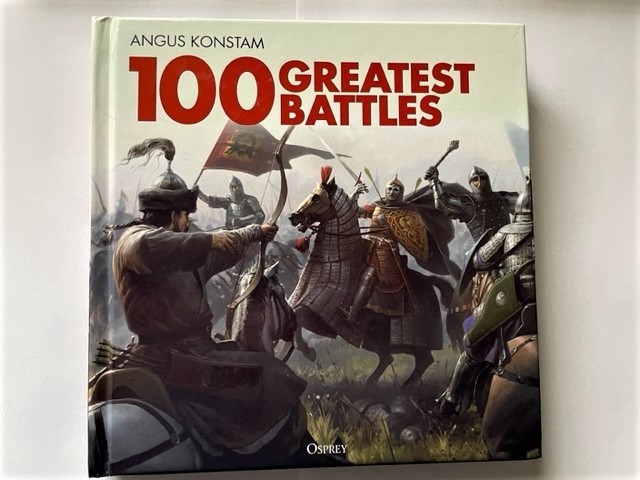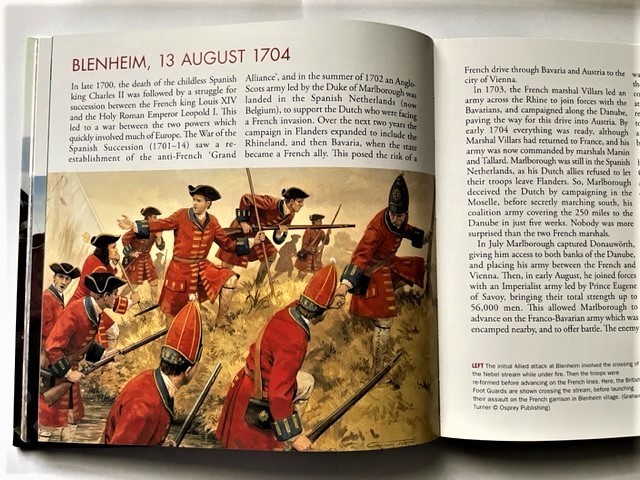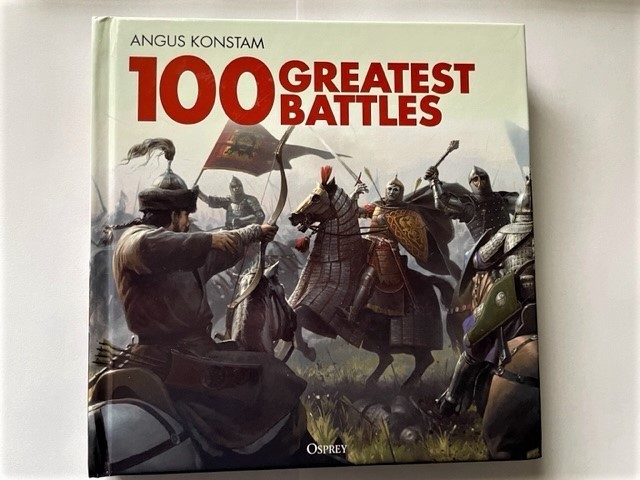
100 Greatest Battles
223 pages
7.75x7.75 inches
hard cover
by Angus Konstam
ISBN HB9781472856944.
Books of this type by their nature are subjective. However Konstam has done a reasonably good job of collecting and summarizing what he thinks are the 100 greatest. For the battles to be included there needed to be sufficient documentation allowing them to be described in written detail. For that reason the list begins when historians began leaving written records of events, military or otherwise.
Contents
The book is divided into nine chapters, The Ancient World, The Medieval World, The Renaissance, The Age of Reason, The Napoleonic Era, The Age of Empires, World War I, World War Two, and The Modern Age. Within those nine chapters are the battles Konstam has chosen, beginning with Marathon and concluding with Desert Storm.
As might be expected coverage of the individual battles is is rather slim, limited to only one and a third pages. The first page of each battle is accompanied by a painting that covers the bottom two thirds of the page. There is a brief caption on the facing page describing the action.

Review
Few would argue about many of the battles selected, i.e. Marathon, Cannae, Waterloo, to name a few. Others one might question such as the Somme, which was an unmitigated disaster tactically and strategically. The chapter on the Napoleonic wars curiously omits the Battles of Jena-Auerstadt. These battles destroyed the Prussian Army forcing Prussia to sue for peace. As a result the Prussian army began a series of reforms leading to the creation of the General staff and Prussia's eventual reentry into the war against Napoleon. The arrival of Blucher's cavalry at Waterloo was one of the decisive events that led to Wellingtons victory. Moreover, the creation of the German General Staff would have consequences well into the Twentieth Century. He also draws some incomplete or incorrect observations. In the sub chapter Kharkov-19 February-March 1943, he concludes that Manstein's counter stroke and the recapture of Kharkov allowed the Germans to regroup after Stalingrad and to prepare for Kursk. While this was so, the greater achievement was that Manstein's success prevented the Russians from cutting off the entire Southern Front thus unhinging the rest of the Eastern Front.
The book is very Eurocentric in it's coverage. Battles involving the Islamic world are only dealt with as they pertain to battles of the Crusades or the various attempts to capture Constainople. There is no mention of any of the battles that ensured the safety and survival of the Prophet Muhammed and his small band of followers or any of the battles that saw the rapid expansion of Islam across the Arabian Peninsula and North Africa after Muhammed's death. Similarly, there is little to do with with the Far East. While he does deal with Japan somewhat, i.e. The Tokogawa Shogunate, there is virtually nothing on China but the attempt to invade Japan in 1281. One might expect there to be something devoted to Mao's victory over the Nationalist under the Modern Age section but alas there is nothing there.
The above review points to one of the difficulties of book such as 100 Greatest Battles . The choice of which battles to include or not is entirely subjective despite efforts to establish objective criteria for their inclusion. Like books that list the best western or the 100 best films, everyone has their favorites. While there may be agreement on some selections, other choices will cause some to scratch their heads, and invariably there will be those left off the list which some will think should be included.
While the book may not be for the hard core military history buff it does serve as an introduction to many of the important battles that have occurred throughout history. For the military historian and armchair generals it is a conversation starter.

























